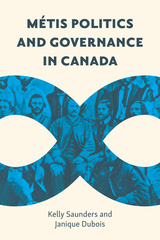
Ask any Canadian what “Métis” means, and they will likely say “mixed race” or “part Indian, part white.” Canadians consider Métis people mixed in ways that other indigenous people -- First Nations and Inuit -- are not, and the census and the courts have premised their recognition of the Métis on this race-based understanding.
Chris Andersen argues that Canada got it wrong. He weaves together personal anecdotes, critical race theory, and discussions of history and law to demonstrate that our understanding of “Métis” -- that our very preoccupation with mixedness – is not natural but stems from more than 150 years of sustained labour on the part of the state, scholars, and indigenous organizations. From its roots deep in the colonial past, the idea of “Métis as mixed” pervaded the Canadian consciousness through powerful sites of knowledge production such as the census and courts until it settled in the realm of common sense. In the process, “Métis” has become an ever-widening racial category rather than the identity of an indigenous people with a shared sense of history and culture centred on the fur trade.
Andersen asks all Canadians to consider the consequences of adopting a definition of “Métis” that makes it nearly impossible for the Métis nation to make political claims as a people.
This book will appeal not only to students and scholars of Aboriginal studies, Canadian studies, law, and politics but to Canadians who identify as Métis and who participate in debates and discussion about Métis identity.
Awards
- 2015, Winner - NAISA Best Subsequent Book Prize, NAISA
‘Métis’ is, without a doubt, essential reading for everyone who studies the Métis, Indigeneity, and/or race and racialization as it provides a powerful critique of Métis racialization and an example of the impact of racialization on Indigenous nations.
Andersen's book is thorough and deep, insightful and provocative. Some will find it unsettling. But, for anyone interested in questions of Métis identity, or more generally Indigenous rights in Canada, it is an essential read.
Andersen does a superb job of engaging with the scholarship of the field, allowing the reader to gain a clear understanding of its historical trajectory and where Andersen’s work stands in comparison ... Métis is an important contribution and I expect that it will spur lively discussions, productive critiques, and shift the scholarship in the field.
This provocative book argues against Métis-as-mixed and unapologetically goes against the grain of scholarship in this field. It will sharpen your views about M/métis rights and representation in Canada, and Indigeneity more generally.
Chris Andersen challenges the very core of Canadian racial mythology in this provocative, detailed, well-articulated argument about what it means to be Métis in Canada. For readers who seek to understand how courts, census offices, and Canadians in general have seen and misunderstood one of the nation’s most intricate issues of identity and belonging, this book will help them move along a path toward deeper and more respectful ways of acknowledging and appreciating the Métis people.
As a scholar who has worked for a long time in this field, I learned much from this book. Like many other Canadians, I did not have a clear answer to the question, who are the Métis? Chris Andersen offers the tools for understanding this puzzling question and makes clear what is at stake in contesting Métis identity.
Foreword / Paul Chartrand
Introduction
1 Mixed: The History and Evolution of an Administrative Concept
2 Métis-as-Mixed: The Supreme Court of Canada and the Census
3 The Métis Nation: A People, a Shared History
4 Métis Nation and Peoplehood: A Critical Reading of the Supreme Court of Canada and the Census
5 A Case of (Mis)recognition: The NunatuKavut Community Council
Conclusion
Notes; Works Cited; Index













